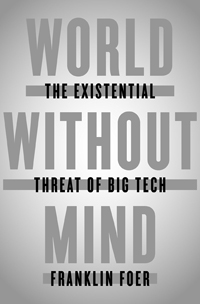 Franklin Foer, World without Mind: The Existential Threat of Big Tech (New York: Penguin Press, 2017), 257pp.
Franklin Foer, World without Mind: The Existential Threat of Big Tech (New York: Penguin Press, 2017), 257pp.
Franklin Foer admits that he's a nostalgist and traditionalist who loves old school books and magazines. He also admits that he's angry about what the digital disruptions of our age have done to this beloved world of readers and writers.
From 2006 until 2010, Foer was the editor of the venerable New Republic magazine (founded in 1914). In 2012, Chris Hughes, the cofounder of Facebook, purchased the majority ownership of TNR and rehired Foer. In 2014, he then fired him, which precipitated a mass resignation of two-thirds of the staff and a crisis of survival. After investing more than $20 million, Hughes sold TNR in 2016. In many ways, this tumultuous story is just one of many that has been caused by the unbridled power of the tech giants.
So, Foer's book is personal, but it's much more than the story of one editor or magazine. It's an important contribution to the growing literature, much of it written by insiders, about the frightening impact of GAFA — Google, Amazon, Facebook, and Apple (you can include Microsoft). These companies don't just want to sell us stuff. No, "they aspire to encompass all of existence."
However crazy that sounds, Foer means it in a literal way. These companies have nothing less than religious convictions about their mission and identity. The aspirations of GAFA are "limitless." In fact, it is quite simple to show how their "stunningly coherent set of values and beliefs" is "rather commonplace" in Silicon Valley.
Foer worries about the erosion of principles that have heretofore protected important civic and personal values — marketplace competition, individuality, free choice, intellectual property, and personal privacy. GAFA now enjoys a near monopoly over the production and consumption of knowledge, and thus the ability to remake and control economic markets. Whereas "monopoly" used to be a bad word, these companies embrace it unabashedly as an urgent social good that's essential to their digital utopia. As a result of GAFA's unchecked powers of surveillance, big data collection, resultant algorithms, and manipulations of digital behavior, we're now on what Foer calls a "terrifying trajectory."
In the last part of his book Foer makes two suggestions. First, he supports greater regulation through what he calls a "Data Protection Authority," akin to the recently founded Consumer Protection Bureau. It's very hard to imagine that GAFA would, under any circumstances, restrain itself. Second, individual people need to reject fatalism, and carve out their own human spaces. There is, says Foer, "the imperative to resist." The New York Times listed World Without Mind as a "notable book" of 2017.


